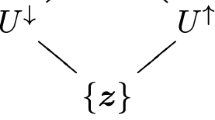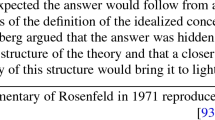The term measurement theory refers to that part of a physical theory in which the empirical and operational content of the concepts of the theory is determined. Measurements are analyzed both as operational procedures defining the ► observables of the theory and as physical processes which are themselves subject to the laws of physics.
In classical physics, measurements are performed in order to determine the values of one or several observables of the physical system under consideration. Classical physics allowed the idealized notion that every physical quantity has a definite value at any time, and that this value can be determined with certainty by measurement without influencing the object system in a significant way. By contrast, in quantum mechanics both features fail to hold without strong qualifications. Accordingly, in their seminal paper of 1935 [1], Einstein, Podolsky and Rosen used elements of this description as a sufficient criterion of physical reality, applicable both in classical and quantum mechanics:
Access this chapter
Tax calculation will be finalised at checkout
Purchases are for personal use only
Preview
Unable to display preview. Download preview PDF.
Similar content being viewed by others
Primary Literature
Einstein, A., B. Podolsky, N. Rosen: Can quantum-mechanical description of physical reality be considered complete? Physical Review 47, 777–780 (1935).
Heisenberg, W.: Ü ber den anschaulichen Inhalt der quantentheoretischen Kinematik und Mechanik. Zeitschrift für Physik 43, 172–198 (1927).
Bohr, N.: The quantum postulate and the recent development of atomic theory. Nature 121, 580–590 (1928).
Neumann, J. von: Mathematische Grundlagen der Quantenmechanik (Springer, Berlin 1932, 2nd ed. 1996); English translation (by R. Beyer): Mathematical Foundations of Quantum Mechanics (Princeton University Press, Princeton 1955).
Schrödinger, E.: Die gegenwärtige Situation in der Quantenmechanik. Die Naturwissenschaften 23, 807–812; 824–828; 844–849 (1935). English translation in [12].
Ozawa, M.: Quantum measuring processes of continuous observables, Journal of Mathematicsl Physics 25, 79–87 (1984).
Davies, E.B., J.T. Lewis: An operational approach to quantum Probability, Communications in Mathematical Physics 17, 239–260 (1970).
Secondary Literature
Mittelstaedt, P.: Philosophical Problems of Modern Physics (D. Reidel, Dordrecht 1976).
Busch, P., P. Lahti, P. Mittelstaedt: The Quantum Theory of Measurement (Springer, Berlin 1991, 2nd revised edn. 1996).
Bub, J.: Interpreting the Quantum World (Cambridge University Press, Cambridge 1997).
Mittelstaedt, P.: The Interpretation of Quantum Mechanics and the Measurement Process (Cambridge University Press, Cambridge 1997).
Wheeler, J.A., W.H. Zurek.: Quantum Theory and Measurement (Princeton University Press, Princeton 1983).
Braginsky, V.B., F.Ya. Khalili: Quantum Measurement, edited by K.S. Thorne, (Cambridge University Press, Cambridge 1992).
Busch, P., M. Grabowski, P. Lahti: Operational Quantum Physics (Springer, Berlin 1995, 2nd corrected printing 1997).
Muynck, W.M. de: Foundations of Quantum Mechanics: An Empiricist Approach (Kluwer, Dordrecht, 2002).
Breuer, H.-B., F. Petruccione: The Theory of Open Quantum Systems, (Oxford University Press, Oxford 2002).
Paris, M.G.A., J. Řeháček (Eds.): Quantum State Estimation, (Springer, Berlin, 2004).
Editor information
Editors and Affiliations
Rights and permissions
Copyright information
© 2009 Springer-Verlag Berlin Heidelberg
About this chapter
Cite this chapter
Busch, P., Lahti, P. (2009). Measurement Theory. In: Greenberger, D., Hentschel, K., Weinert, F. (eds) Compendium of Quantum Physics. Springer, Berlin, Heidelberg. https://doi.org/10.1007/978-3-540-70626-7_117
Download citation
DOI: https://doi.org/10.1007/978-3-540-70626-7_117
Published:
Publisher Name: Springer, Berlin, Heidelberg
Print ISBN: 978-3-540-70622-9
Online ISBN: 978-3-540-70626-7
eBook Packages: Physics and AstronomyPhysics and Astronomy (R0)




